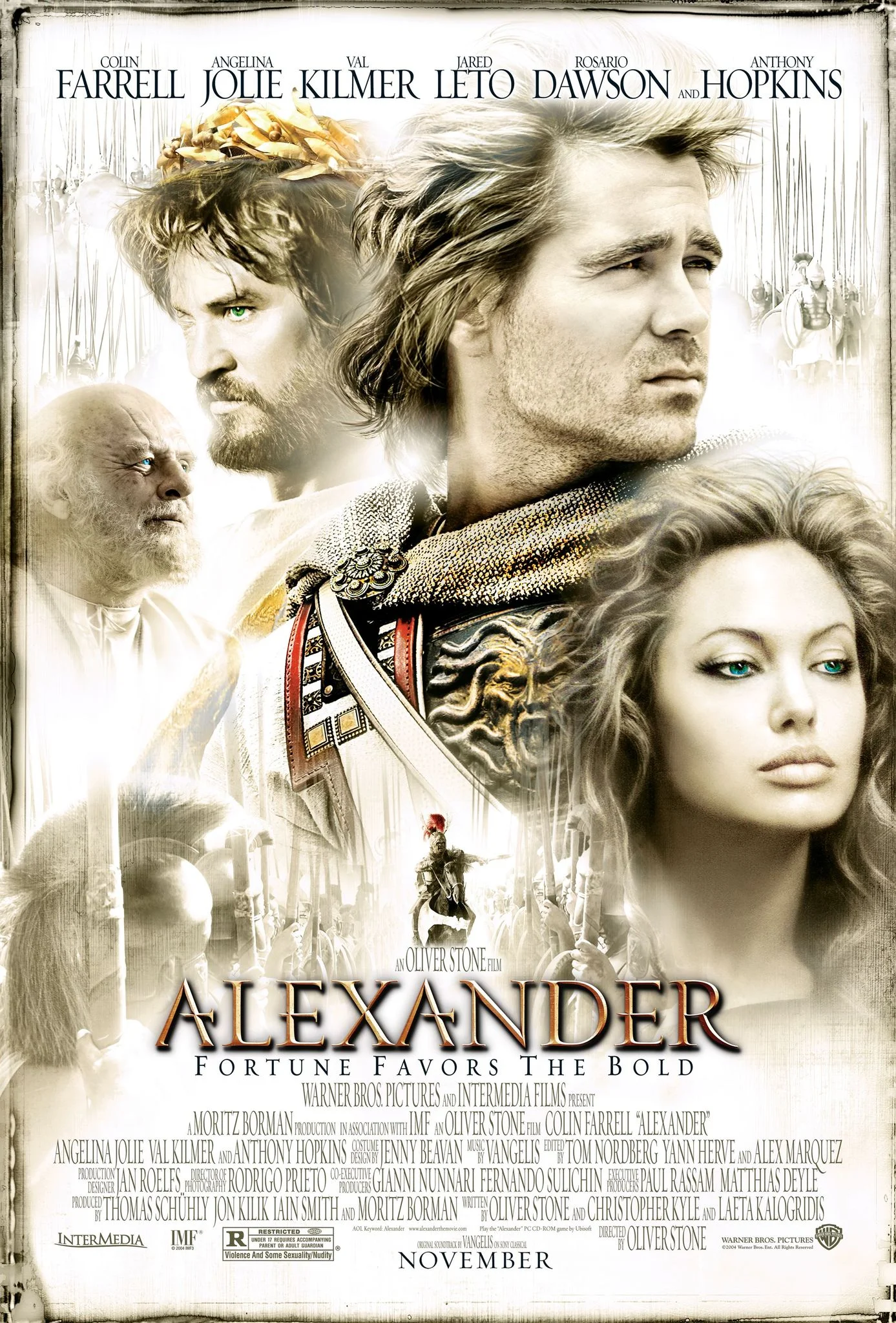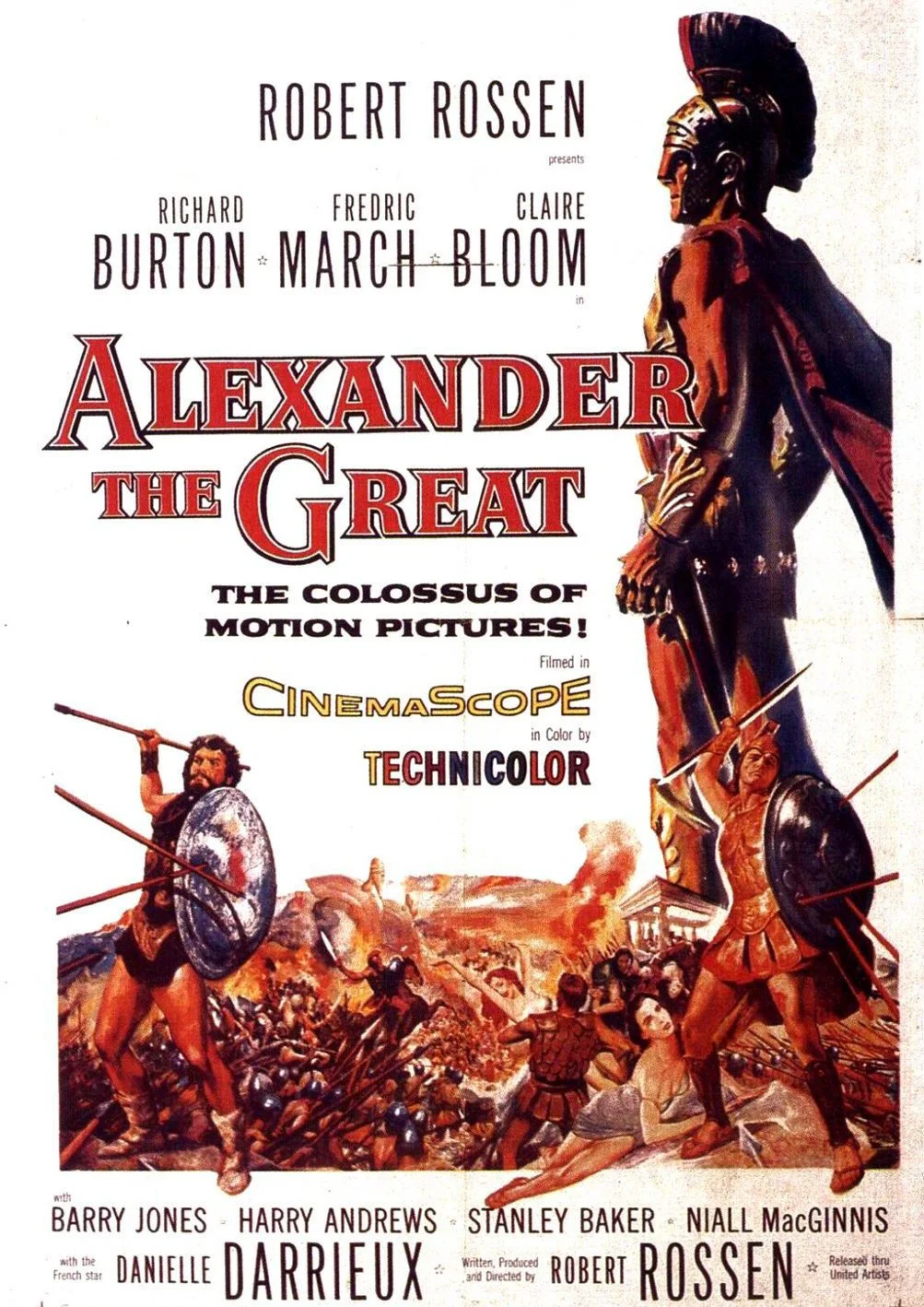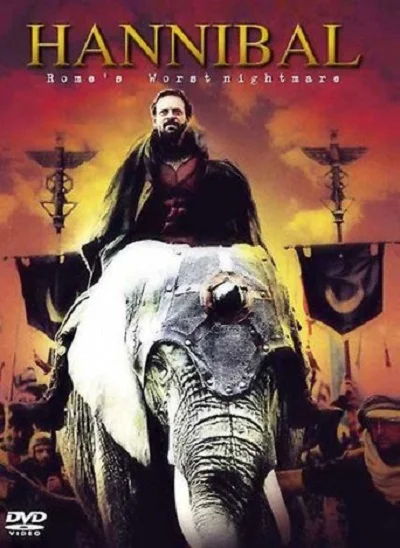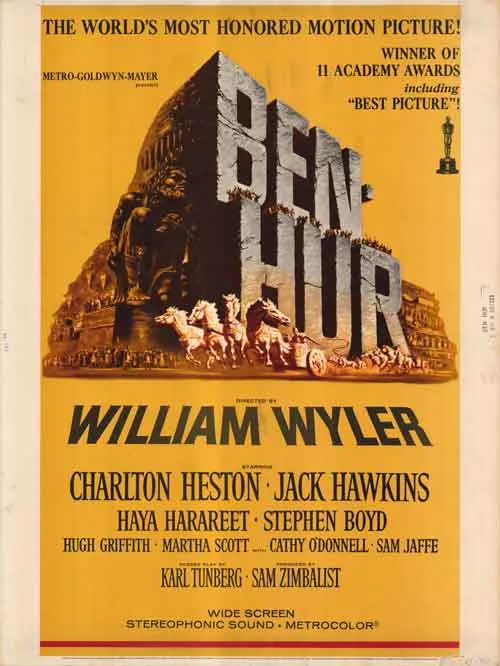CLASSICAL GREECE AND ROME
Romulus & the Sabines (1964) | Orazi e Curiazi / Duel of Champions (1961) | Hero of Rome (1964) | 300 Spartans (1962) | Alexander (2004) | Alexander the Great (1956) | Hannibal: Rome’s Worst Nightmare (2006) | Hannibal (1959) | Scipio Africanus (1937) | Conqueror of Corinth (1961) | Cleopatra (1963)
Romulus & the Sabines (1964)
Date: 8th or 7th century BC
Cinematic Quality: 3 ½ stars
Historical Accuracy: 4 stars
A very fun take on the Roman legend that Romulus prompted his men to steal the Sabine maidens as wives, with all of them getting more than they bargained for. I can’t help giving this B-movie higher marks because James Bond (Roger Moore) plays a marvelous Romulus in all his arrogance, cleverness, charisma, and ruthlessness. The whole story is almost certainly fiction, but the film plays careful homage to the legend even if it does add in plenty of side plots for laughs and drama. If you don’t take the movie too seriously, you’ll discover it’s a great way to while away an hour and a half being introduced to one of the most important legends of regal Rome.
Suitability for children is questionable as it has plenty of suggestive themes given the subject matter (kidnapping women to wed them and have children).
For context, read Carandini’s provocative take in Rome: Day One or Livy, Book 1.
IMDb Synopsis: https://www.imdb.com/title/tt0055356/
Available to watch on Youtube.
Orazi e Curiazi / Duel of Champions (1961)
Date: 7th or 6th century BC
Cinematic Quality: 2 stars
Historical Accuracy: 2 stars
Based on the more embellished Dionysius of Halicarnassus, this lackluster version of the famous duel between Alban and Roman triplets falls completely flat. The acting, dialogue, and historical embellishments are all mildly painful, as is watching Alan Ladd underperform in the lead role. Viewers are treated to a movie about the Roman regal period with a number of the correct historical characters, but the legendary story is so good one wonders how the movie did so badly.
Suitable for children, with some violence and a few kissing scenes.
For context, read Cornell’s The Beginnings of Rome or Dionysius of Halicarnassus, Book 3.
IMDb Synopsis: https://www.imdb.com/title/tt0055264/
Amazon Video: https://www.amazon.com/Duel-Champions-Alan-Ladd/dp/B002V4VG3I
Hero of Rome (1964)
Date: 509 BC
Cinematic Quality: 3 stars
Historical Accuracy: 3 stars
Yet another Italian sword-and-sandal flick with tepid acting, weak dialogue, and plenty of sword play. Still the wall-leaping and log-throwing Gordon Scott is fun as the larger-than-life G. Mucius Scaevola who burned his own hand to show what Romans are really made of. The characters from historical legend are also depicted in the spirit of Livy and Dionysius. The best part of the story is thrown in early, leaving Mucius to sulk about his maimed hand until he can rescue the day with his left hand. The expulsion of the Tarquins, the beginnings of the republic, the story of Lars Porsenna, the bravery of Roman women such as Cloelia, and Mucius’ heroism had many twists and turns, and this version captures some of them adequately, but most will find the B-movie quality a little difficult to endure. If you don’t take it too seriously, you might enjoy it.
Suitable for children, with some violence.
For context, read the Cornell’s The Beginnings of Rome, Livy’s Book 2, and Plutarch’s On the Bravery of Women.
IMDb Synopsis: https://www.imdb.com/title/tt0124319/
Available to watch on Youtube.
300 Spartans (1962)
Date: 480 BC
Cinematic Quality: 4 stars
Historical Accuracy: 4 stars
This version of the Greek stand against the Persians at Thermopylae is superior to the 2006 film, except perhaps in some battle scenes. There are, of course, a few side plots that are fictional, but much of the dialogue, the overarching strategies, and the specific events are straight out of Herodotus and Diodorus. The Spartans are a tad too nice, with no mention of their slave helots, pederasty, or brutishness, but the upshot is that this makes this more watchable with those younger, budding history buffs. I particularly like the camp raid scene mentioned in Diodorus (and not Herodotus) and the film’s depiction of Sparta’s martial republicanism. Thankfully, the sacrificial Thespians—whom many people ignore—also get their nod for their role in the battle. The best part of the movie are the scenes depicting the broader geopolitics, with discussions by characters like Xerxes, Hydarnes, Artemesia, Demaratus, Leonidas, and Themistocles. Herodotus would have appreciated the film’s attention to the complex politics of the Persian Wars and the filmmakers’ imperfect but well-meaning parallels to the Cold War.
Battle scenes and the death of all the Spartans may make the movie unsuitable for children.
For context, read the account by Herodotus, mostly in Books 7 and 8 and the first chapters of Diodorus, Book 11. As for secondary sources, I’m a fan of Peter Green’s classic, The Persian Wars.
IMDb Synopsis: https://www.imdb.com/title/tt0055719/
Amazon Video: https://www.amazon.com/300-Spartans-Richard-Egan/dp/B001NER1EK/ref=tmm_aiv_swatch_0?_encoding=UTF8&qid=&sr=
Alexander (2004)
Date: 350s–280s BC
Cinematic Quality: 4 stars
Historical Accuracy: 4 stars
I must admit I like Oliver Stone’s movie. It was railed by the critics and it takes missteps with plenty of historical details. It suffers from far too many flashbacks and some incredibly confusing scenes, like the inaccurate Battle of Hydaspes. Colin Farrell is mediocre. However, the film is also amazingly accurate at times, particularly with the details in uniforms, tactics, characters, and intrigues within the Macedonian royal house and nobility. It conflates or omits a number of events, but, as I’ve said before, this is a perfectly fine choice for a filmmaker working with so much less time. What makes the movie great is the ability to get to know so many of the key players (Philip, Olympias, Parmenion, Cleitus, Ptolemy, Cassander, Hephaestion, and Antigonus, just to name a few!), the absolutely stupendous battle scene at Gaugamela (the best ancient battle scene ever recreated), the tortured relationships of the Macedonian monarchy, and the conflicting ideas that made a complex historical figure one of the greatest conquerors the world has ever seen. You really get to feel this epic historical life that is filled with every horror imaginable as the bloodthirsty adventurer pushes his amazing Macedonian armies to the edge of the world as they knew it. Then again, maybe I just like the movie so much because I deeply dislike Alexander as a historical person.
Definitely not suitable for children and probably some adults.
For context, read Robin Lane Fox’s Alexander the Great, which inspired the movie. As for primary sources, pick up Arrian of Nicomedia or Quintus Curtius Rufus.
IMDb Synopsis: https://www.imdb.com/title/tt0346491/
Amazon Video: https://www.amazon.com/Alexander-Theatrical-Cut-Colin-Farrell/dp/B001PVHUIS/ref=tmm_aiv_swatch_0?_encoding=UTF8&qid=&sr=
Alexander the Great (1956)
Date: 356–323 BC
Cinematic Quality: 3 stars
Historical Accuracy: 3 stars
Richard Burton’s Alexander is a little more likable than Colin Farrell, so perhaps the movie should be recommended for the sake of balance. The movie does a great job exhibiting the jostling at the Macedonian court from the birth of Alexander to his ascension as king. The first half of the movie is also delightful because viewers are able to see Athens, Demosthenes, and the larger debate among the Greeks over what to do with the rising bully to the north. However, after they cross into Asia the movie becomes too rushed with incredibly lackluster battle scenes, even for the 50s. For a movie about a great conqueror, you just don’t feel the insane Achilles-like drive and the phenomenal proficiency of the Macedonian troops. So if you want your fill of Alexander for a weekend in, start with this one to understand the broader story in a significantly tamer version, and then move to the much heavier 2004 flick if you can handle that much mania for world domination.
Only suitable for children if you are okay with them watching mild war action violence and a few suggestive scenes.
For context, there are lots of great books on Alexander so I’ll recommend a broader text I love, Hammond’s The Macedonian State. For context read the sources mentioned above or you can try Plutarch’s Life of Alexander.
IMDb Synopsis: https://www.imdb.com/title/tt0048937/
Amazon Video: https://www.amazon.com/Alexander-Great-Richard-Burton/dp/B000RKW4KC/ref=tmm_aiv_swatch_0?_encoding=UTF8&qid=&sr=
Hannibal: Rome’s Worst Nightmare (2006)
Date: 237–182 BC
Cinematic Quality: 3 stars
Historical Accuracy: 4 stars
This film is my favorite depiction of the Punic Wars. Technically a “dramatic documentary” the quality is good enough to classify as a solid B movie. Even for a dramatic documentary, I have to ding it one star for a few bad choices. First of all, they distort several events to make the Romans the evil imperialists (I kept waiting for Darth Vader to pop out in a toga). Second, they oversimplify a number of features: Hannibal has to launch a defensive war because Rome will anyway, Hannibal loses the war because he didn’t besiege Rome, Carthage stupidly refuses to reinforce Hannibal when he desperately needs it. None of these are true, at least not in their entirety. Still, the movie is a great outline of the war with good performances by the actors playing the Carthaginians Hamilcar, Hasdrubal, Mago, Maharbal, and Gisco, even if Star Trek fans only see Dr. Bashir for Alexander Siddig’s Hannibal. As for the Romans, neither of the Hannibal movies portrays Q. Fabius Maximus for all his qualities, but the consuls P. Cornelius Scipio, T. Sempronius Longus, and G. Terentius Varro are portrayed fairly well. The best performance by far is Shaun Dingwall’s Scipio Africanus, which was close to perfect. Scipio is a perfect blend of prudence and arrogance. That’s the shrewd and competitive aristocratic leadership that allowed Rome to win!
Some battle scenes probably make the movie unsuitable for children.
For context, read Hoyos’ outstanding Mastering the West. For primary sources, read Polybius books 2-15 or Livy books 21–30.
IMDb Synopsis: https://www.imdb.com/title/tt0766213/
Available to watch on Youtube.
Hannibal (1959)
Date: 218–203 BC
Cinematic Quality: 2 ½ stars
Historical Accuracy: 3 stars
This film warrants 3 stars for the opening scene in the Alps. Unfortunately, much of the movie is downhill (literally) from there. Victor Mature is a good Hannibal, but the romantic side plot is an unnecessary distraction from a story already filled with drama. The movie pays homage to most of the ancient texts and one gets a feel for Hannibal and some of the tension within the Roman senate, but an overcommitment to the fictitious love story prompts a number of historical blunders and wastes too much screen time. This is particularly the case with the final minutes of the movie that wrap up the last decade of the war in Italy far too quickly. This attempt to capture one of the most epic wars of all time thus falls flat.
Suitable for children, with a few battle scenes and heavy themes.
For context, read the Eve MacDonald’s innovative biography, Hannibal: A Hellenistic Life. For primary sources, read Polybius books 2–15 or Livy books 21–30.
IMDb Synopsis: https://www.imdb.com/title/tt0053891/
Amazon Video: https://www.amazon.com/Hannibal-Victor-Mature/dp/B07NDGWWNJ
Scipio Africanus (1937)
Date: 205–202 BC
Cinematic Quality: 4 stars
Historical Accuracy: 4 stars
Produced during the rise of fascism in Italy, this Mussolini-funded film was intended to use the historical Roman invasion of Africa to promote Italian intervention abroad in the 1930s. Such a context makes this a must-see for film critics and history buffs both ancient and modern. It also makes the over-the-top elements more illuminating—are the crowds hailing a victorious Roman imperator or a fascist Italian dictator?
The epic is also well worth watching because it does a fair job showing the later years of the Second Punic War. The film stays close to the sources, and the plot benefits from the side story of Sophonisba, the brave and crafty daughter of Hasdrubal son of Gisco. As for the historical characters, Fabius and Cato are portrayed well in the opening scenes. The Numidian rivals Syphax and Masinissa are excellent, and Camillo Pilotto is a decent Hannibal. Unfortunately, the title character, ironically played by Annibale Ninchi, is just not the charismatic and complex Scipio Africanus that leaps off the pages of Polybius and Livy. How could Mussolini have let his muse be so tepid? For a great Scipio, viewers need to see Shaun Dingwall in the 2006 film. Animal-lovers should be warned about the damage done to elephants in the recreated Battle of Zama, which is a fairly accurate and detailed depiction of the climatic finish to the war.
Some battle carnage and heavy themes may make it unsuitable for young children.
For context, read either of the secondary sources mentioned above or Livy book 28.38 (Scipio’s return and the senate debate) – book 30 and Polybius books 14–15.
IMDb Synopsis: https://www.imdb.com/title/tt0029526/
Conqueror of Corinth (1961)
Date: 146 BC
Cinematic Quality: 2 ½ stars
Historical Accuracy: 2 ½ stars
This forgettable sword-and-sandal flick purports to depict the events surrounding the Achaean War and Rome’s sack of Corinth in 146 B.C. With the film focusing primarily on the oversimplified internal politics of the league and a fabricated love story, a very interesting geopolitical event in history is obfuscated. It’s unfortunate, because a delightful villain and the blundering juggernaut of the Roman legions in Greece could have made an interesting story.
Battles scenes and creepy snake pits might make the movie unsuitable for children.
For context read Polybius on the event or Robin Waterfield’s Taken at the Flood, which takes a very anti-Roman interpretation of Roman expansion.
IMDb Synopsis: https://www.imdb.com/title/tt0055866/
Cleopatra (1963)
Date: 1st Century
Cinematic Quality: 4 stars
Historical Accuracy: 3 stars
Cleopatra’s story deserves as much drama and sumptuousness as imaginable, and this film delivers. As for historicity, the epic faithfully depicts much of Cleopatra’s story, which is why some Egyptologists praise the movie. I have to ding it a little for overplaying Octavian so early, for lavishness at a few of the wrong moments (her entrance parade into Rome is amazing but inaccurate), and for smoothing over the atrocities of the protagonists involved. Caesar was a genocidal conqueror, even by ancient standards, and Cleopatra had a penchant for murdering any and all rivals. Poor Antony’s story was written by all of his enemies, but the filmmakers stay close to Plutarch’s portrayal of the meteoric triumvir. Once you get past these imperfections, you can enjoy a treat for the eyes that will leave you mourning the demise of the republic, longing for world empire, and depressed at the death of everyone involved. Enjoy!
Some heavy themes make the movie unsuitable for younger children.
For context, read the appropriate lives of Plutarch and selections from Suetonius and Appian. I like Strauss & Ober’s interpretation of Antony and Cleopatra in The Anatomy of Error, and Tyldesley has a solid biography, Cleopatra: Last Queen of Egypt.
IMDb Synopsis: https://www.imdb.com/title/tt0056937/
Amazon Video: https://www.amazon.com/Cleopatra-Elizabeth-Taylor/dp/B000JJH7VC
Ben Hur (1959)
Date: 20s-30s AD
IMDb Synopsis: https://www.imdb.com/title/tt0052618/
Amazon Video: https://www.amazon.com/Ben-Hur-Charlton-Heston/dp/B001I7W2JG











